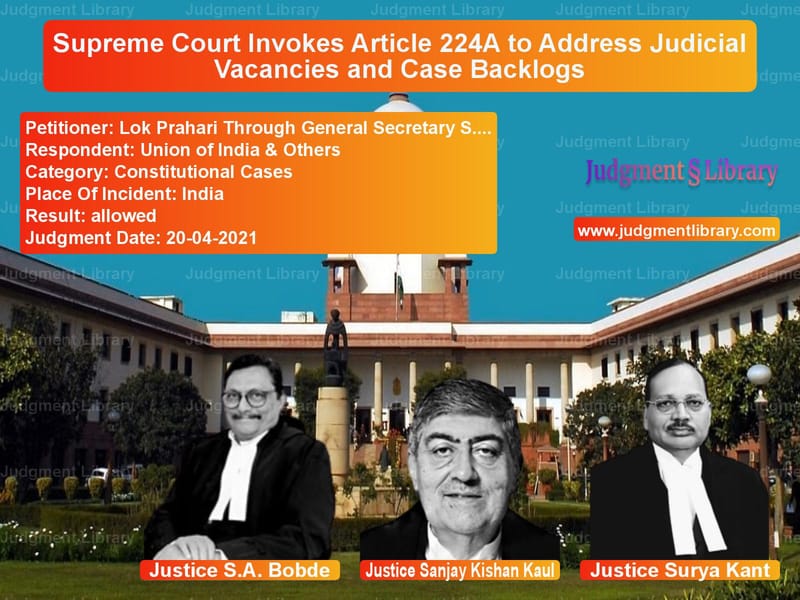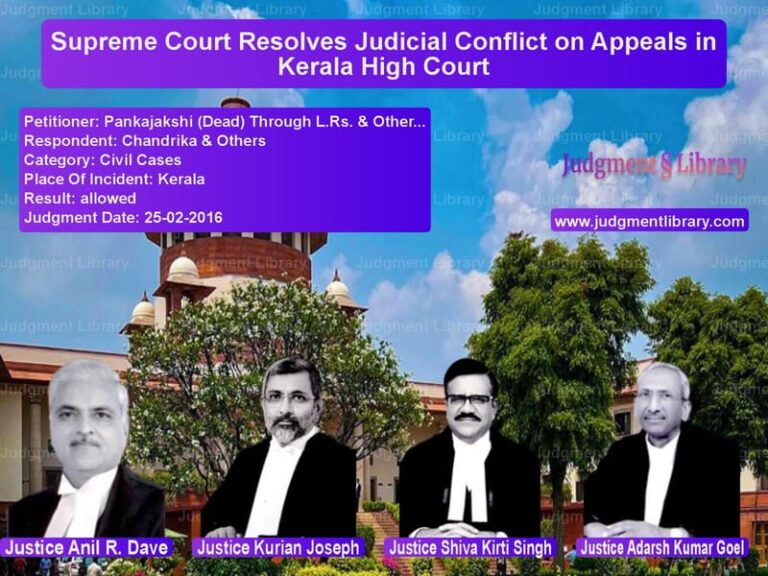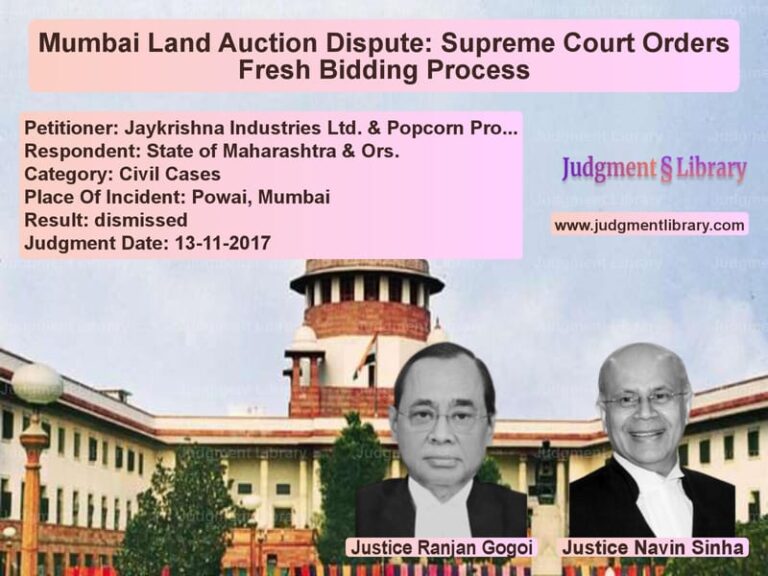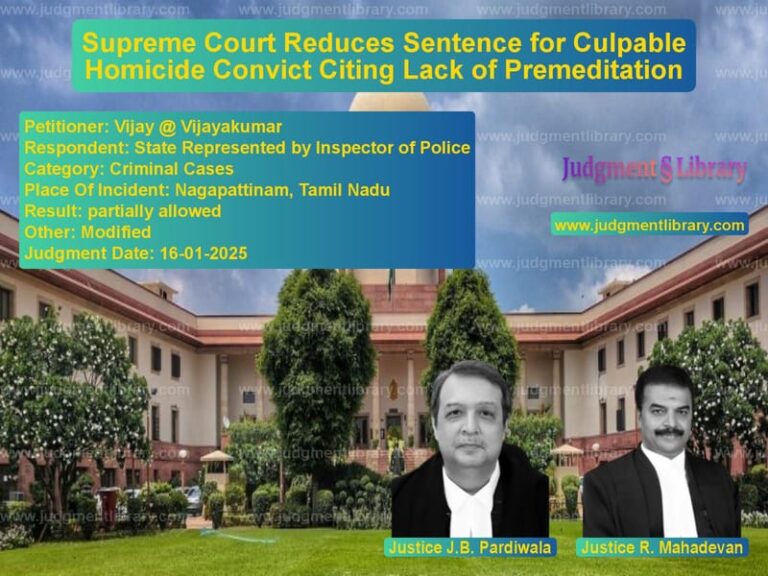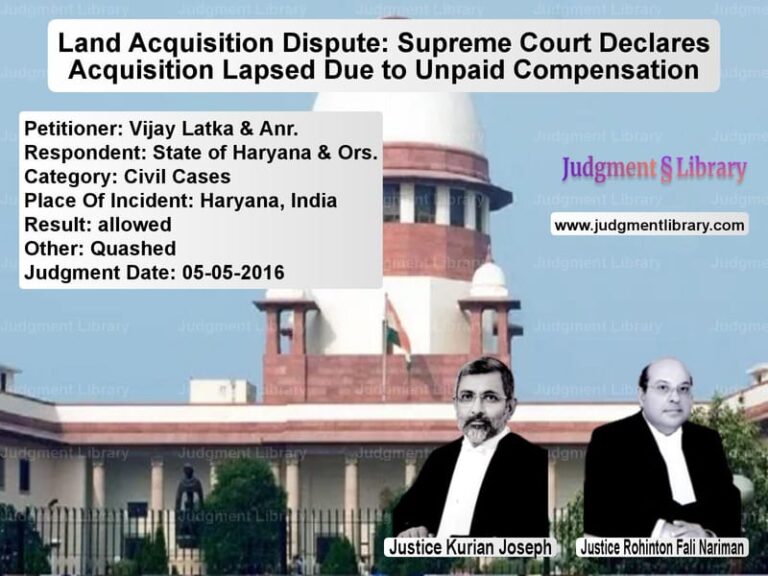Supreme Court Invokes Article 224A to Address Judicial Vacancies and Case Backlogs
The Indian judiciary has long grappled with an overwhelming backlog of cases, significantly hindering access to timely justice. In a landmark ruling, the Supreme Court in Lok Prahari Through General Secretary S.N. Shukla IAS (Retd.) vs. Union of India & Others invoked Article 224A of the Indian Constitution to address this crisis. This provision, which had largely remained dormant, allows retired High Court judges to be temporarily appointed as ad-hoc judges to manage excessive case pendency. With over 57 lakh pending cases and judicial vacancies exceeding 40%, this decision aims to provide immediate relief while ensuring the integrity of the judicial system remains intact.
Background of the Case
The case was filed as a public interest litigation (PIL) by the petitioner, Lok Prahari, a non-governmental organization, through its General Secretary, S.N. Shukla IAS (Retd.). The petition underscored the growing inefficiency of the judiciary due to an ever-increasing backlog of cases and a shortage of judges in various High Courts. The petition pointed out that despite the constitutional provision under Article 224A, which allows the appointment of retired judges on an ad-hoc basis, it had remained unused for decades.
The petitioner sought immediate action from the Supreme Court to activate this provision as a temporary but necessary measure to mitigate delays in the judicial system.
Petitioners’ Arguments
The petitioners, represented by senior counsel, argued:
- The backlog of cases in High Courts had reached an alarming level, with many cases pending for over a decade.
- Judicial vacancies had consistently remained above 40%, making it impossible to clear the growing backlog.
- Article 224A was introduced precisely for situations like this, where the judiciary needed additional resources.
- Retired judges possess valuable experience and can be brought in immediately, avoiding the time-consuming process of appointing new judges.
- Delays in resolving cases violate citizens’ fundamental rights, particularly the right to speedy justice under Article 21 of the Indian Constitution.
Respondents’ Arguments
The respondents, including the Union of India, opposed the invocation of Article 224A, arguing:
- The priority should be filling regular judicial vacancies rather than relying on ad-hoc measures.
- Appointing ad-hoc judges might undermine the independence of the judiciary and interfere with the regular judicial appointment process.
- Retired judges may lack the motivation and efficiency needed for long-term judicial functions.
- There was no precedent for large-scale activation of Article 224A, and such a move required careful deliberation.
Supreme Court’s Findings
The Supreme Court, comprising Chief Justice S.A. Bobde and Justices Sanjay Kishan Kaul and Surya Kant, delivered a detailed judgment addressing the issue comprehensively. The Court made the following key observations:
1. Judicial Backlog is a Crisis
The Court acknowledged the severity of the backlog, noting that the pending cases had reached 57 lakh, with some dating back over 30 years. The situation demanded urgent intervention.
2. Activation of Article 224A is Necessary
The Court ruled that Article 224A should be activated immediately and set clear guidelines for appointing ad-hoc judges:
- High Court Chief Justices can invoke Article 224A if judicial vacancies exceed 20%.
- Ad-hoc judges can be appointed for a fixed period of 2 to 3 years.
- These judges will primarily focus on cases pending for over five years.
- They will not be assigned administrative work and will solely handle case disposals.
- Retired judges will not be allowed to engage in arbitration or legal practice during their tenure.
3. Ensuring No Interference with Regular Appointments
The Court clarified that invoking Article 224A was not an alternative to appointing regular judges but a temporary measure to address the backlog.
4. Consent of Retired Judges
The Court ruled that retired judges must provide their consent before being appointed as ad-hoc judges. The Chief Justice of a High Court must personally interact with each retired judge before making a recommendation.
5. Process and Guidelines for Appointment
To ensure transparency and efficiency, the Court outlined a step-by-step process:
- The Chief Justice of a High Court will identify retired judges and seek their consent.
- A recommendation will be made to the Supreme Court Collegium.
- Once approved, the proposal will be forwarded to the President of India for final consent.
- The appointment will be formalized through a notification in the Gazette of India.
Judgment and Conclusion
The Supreme Court delivered a decisive verdict, stating:
“We see no reason why there should be an unending debate on taking recourse to Article 224A when such a provision exists in the Constitution. It should not be made a dead letter, more so when the need is so pressing.”
The Court directed High Courts to start implementing Article 224A immediately, with the goal of reducing pending cases significantly over the next few years. Additionally, the Ministry of Justice was asked to submit a report within four months detailing the progress made in implementing the decision.
This ruling marks a significant step in tackling judicial delays, ensuring that citizens receive timely justice without compromising the integrity of the judicial appointment process.
Petitioner Name: Lok Prahari Through General Secretary S.N. Shukla IAS (Retd.).Respondent Name: Union of India & Others.Judgment By: Justice S.A. Bobde, Justice Sanjay Kishan Kaul, Justice Surya Kant.Place Of Incident: India.Judgment Date: 20-04-2021.
Don’t miss out on the full details! Download the complete judgment in PDF format below and gain valuable insights instantly!
Download Judgment: lok-prahari-through-vs-union-of-india-&-oth-supreme-court-of-india-judgment-dated-20-04-2021.pdf
Directly Download Judgment: Directly download this Judgment
See all petitions in Public Interest Litigation
See all petitions in Constitution Interpretation
See all petitions in Fundamental Rights
See all petitions in Judgment by S. A. Bobde
See all petitions in Judgment by Sanjay Kishan Kaul
See all petitions in Judgment by Surya Kant
See all petitions in allowed
See all petitions in supreme court of India judgments April 2021
See all petitions in 2021 judgments
See all posts in Constitutional Cases Category
See all allowed petitions in Constitutional Cases Category
See all Dismissed petitions in Constitutional Cases Category
See all partially allowed petitions in Constitutional Cases Category

